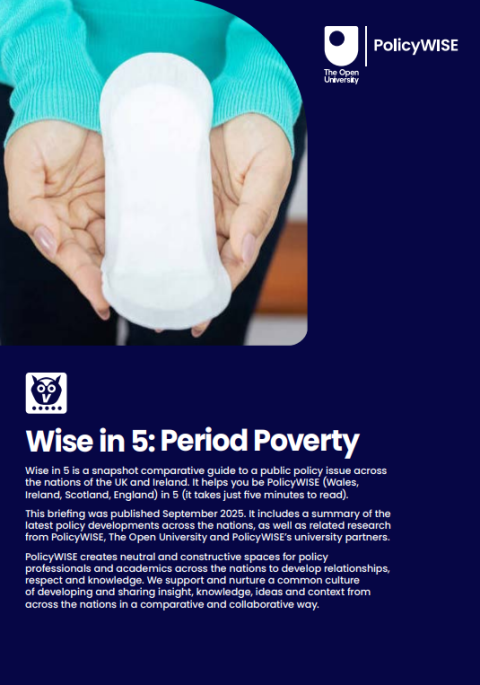New PolicyWISE report reveals sharp rise in period poverty across UK and Ireland.

One in five women and girls can’t afford products, with students losing up to 11 weeks of study time across a degree.
Period poverty is rising sharply across the UK and Ireland, according to new analysis from PolicyWISE. The Wise in 5: Period Poverty briefing, published today, shows:
- 21% of women and girls struggle to afford period products – up from 12% in 2022.
- 2 million girls aged 14–21 are missing school due to their periods.
- Students who menstruate miss an average of 10 study days per year, while those with menstrual health conditions miss 19 days annually – equal to 11 weeks of lost study over a three-year degree.
- Chemical contamination concerns have been raised in widely available products.
The cross-nation review highlights stark disparities in provision, safety standards, and cultural sensitivity that undermine education, wellbeing, and dignity.
Scotland shows policy progress
Scotland’s 2021 Period Products Act grants everyone a legal right to free products, with oversight from Zero Waste Scotland to ensure safety and sustainability. Despite this, the report finds 25% of students still experience period poverty—higher than the UK average of 10%.
“Scotland’s high rates don’t indicate policy failure – they reveal the true extent of period poverty that other nations aren’t properly measuring or addressing,” said Abianna Burke, PolicyWISE Intern and lead author. “Without comprehensive data, it is impossible for other countries to develop effective solutions.”
Safety concerns raised
The briefing warns that tampons have been found to contain glyphosate at levels 40 times higher than permitted in drinking water, as reported by The Guardian and the Pesticide Action Network UK. These chemicals are absorbed vaginally and bypass the body’s detoxification system, yet most public schemes do not require ingredient disclosure or safety testing.
Nation-by-nation comparison shows unequal access
Where you live determines the support you receive:
- Scotland – Free access in schools, workplaces, and public buildings; strong sustainability focus; still high poverty levels (25%).
- Wales – £3.3m since 2018 for schools, colleges, nurseries, plus £220k for community provision in libraries and hubs; young people consulted on culturally appropriate choices.
- Northern Ireland – Legal framework passed in 2022 but stalled; access varies by school and location.
- Ireland – Action Plan (2021) provides free products in schools, libraries, and sports clubs; EU safety standards ensure stronger oversight, though provision less comprehensive than Wales or Scotland.
- England – Voluntary scheme since 2020; inconsistent provision and limited product choice; safety standards lacking.
“Period poverty is not just about access – it’s about safe, consistent, and dignified provision that supports education and wellbeing,” said Catherine May, Senior External Affairs and Communications Manager, PolicyWISE. “No young person should miss out on school or university because of stigma, pain, or lack of affordable products.”
Five Policy Priorities for Change
PolicyWISE identifies five critical areas:
- Legal frameworks: Improve access, backed by political will and funding.
- Safety standards: National oversight to prevent chemical contamination.
- Economic support: Address underlying poverty driving period insecurity.
- Cultural sensitivity: Ensure discreet provision and product choice beyond tampons.
- Data collection: Enable effective cross-nation learning and stronger policy.
